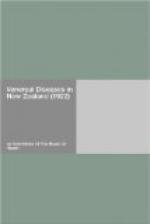In regard to the teaching of sex hygiene in schools some interesting evidence was given to the Committee by Mr. Caughley, Director of Education, Mr. T.R. Cresswell, Principal of the Wellington College (speaking on behalf of the Secondary Schools Association), and by some of the women doctors and others who were good enough to attend as witnesses.
Mr. Caughley stresses the point that it is not mere knowledge of physiology that will meet the case. He considers that the most important thing of all is to establish in the minds of the children noble ideals with regard to infanthood and motherhood. Lessons in connection with the care of all birds and animals for their young, with the love and devotion of parents for their young, with all that is beautiful and tender connected with the homes of animals and birds, would establish a kind of reverence about everything that is connected with birth. He deprecates mechanical, systematic, and consecutive instruction in the mere facts of sex hygiene, for even the fullest knowledge on this subject is known to have very little deterrent effect in the temptations of life. He would rather aim at creating the right atmosphere in a school, such as would make any coarse or unworthy mention of any of these matters in the hearing of a child appear more or less repulsive, and would in general enable him to put in its proper setting any knowledge that might come to him from various sources.
Mr. Cresswell gave the Committee an extremely interesting resume of the answers to a questionnaire which he addressed to the head of every secondary school in the Dominion. He suggested—(1) That a determined public effort should be made to rouse parents to a sense of their responsibility in regard to this matter by means of broadcasted pamphlets, and that they should be furnished with simple, specially written leaflets to assist them in giving instruction to their children; (2) that sex hygiene be made a compulsory subject in all training-colleges, the instructors being specially qualified doctors; (3) that regular courses of public lectures be delivered in suitable centres; (4) that teachers, and especially physical instructors, be encouraged to stress the value of physical fitness to pupils collectively, and, where need is indicated, to have private talks with individuals; (5) that teachers be advised to take every opportunity during lessons in hygiene, physiology, botany, &c., to give children a sane and normal outlook on sex matters.
Incidentally it was suggested that girls’ schools suffer somewhat through being staffed almost exclusively by celibate teachers. “The knowledge and sympathy of a real mother would,” it was urged, “be invaluable to many girls in our secondary schools. Does it seem a trivial suggestion that in every girls’ school there should be one honoured official, the ‘school mother,’ a sympathetic motherly person whose duty it should be to get into personal touch not only with individual girls but also with individual parents?”




